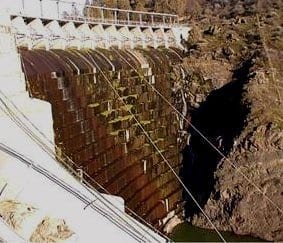The Klamath Dam Removal Legislation: “The time for Congress to act is now”
The pressure is growing to take down the Klamath River Dams; the draft report released by the U.S. Department of the Interior says a landmark agreement to remove dams in the Klamath Basin will restore salmon and sustain irrigation for farmers in Southern Oregon and Northern California.
North Coast Congressman Mike Thompson (D-St.Helena) has introduced legislation supporting the Klamath Basin Restoration Agreement (KBRA), and in a media release, he says “The time for Congress to act is now.”
From the Eureka Times-Standard:
The findings seem to support a bill recently introduced by Sen. Jeff Merkeley, D-Oregon, and North Coast Congressman Mike Thompson, D-St. Helena, that would authorize the Interior Department to decide whether to remove the four Klamath River dams.
Thompson issued a statement on Tuesday urging his colleagues in Congress to act on the bill, which dam-removal proponents claim is being held hostage by the partisan rancor that is enveloping the Capitol.
And this:
”The synthesis of studies released today scientifically confirms that the agreements in place represent the best way forward for the Klamath River Basin and its communities,” Thompson said in the release. “Years of scientific and technical studies have concluded that the dam removals will not only benefit our river basin by restoring fish and wildlife habitats, it will strengthen our economy by creating thousands of jobs. The time for Congress to act is now.”
The story details the legislative roadblocks to the KBRA’s implementation (mostly partisan gridlock in Washington), and the members of the KBRA’s likely response to a congressional failure to meet the March deadline for passing legislation (an extension in the deal).
Click here to read the entire article.
CalTrout will soon help its membership and readership to support the KBRA agreement with their legislator.
http://www.times-standard.com/localnews/ci_19816586






2 Comments
It is a shame that science has become so politicized on the Klamath. We now get reports that don’t “synthesize” but rather “sanitize”. The feds like the KBRA water deal because it will let them and the pampered irrigators they serve out of responsibility for restoring the Klamath River and Klamath Salmon.
The dams will come out because they are a non-performing federal asset. That can and should be done under FERC…not via legislation to which lots of other mischief is attached. The KBRA water deal is a bad for the Klamath River and Klamath Salmon and should be rejected.
There are two types of deals: good deals and bad deals. The Klamath dam deal is bad for taxpayers; the Klamath water deal is bad for salmon and bad for federal tribes. Shame on Mike Thompson for carrying bad legislation.
PC bought the dams years ago knowing they would need to be relicensed and that if they couldn’t be relicensed PacifiCorp would be responsible for removing them. Now they want this sweetheart deal so they can just walk away from all liability for toxic legacies around 100 year old powerhouses.
CalTrout is on the wrong side of this one.
Felice,
We obviously disagree on this one. The fact that the Agreements involve more than removing dams is a defining strength. For years conflict has reigned in the Klamath Basin–water shut offs, fish kills, lawsuits, commercial/sport/tribal fishing closures.
These agreements represent a basin-wide solution supported by those with ‘skin in the game’. The vast majority of farmers in the Upper Basin, the three main tribes that live along the Klamath, commercial fisherman that make their living off catching Klamath River salmon, and a strong contingent of sportfishing and conservation groups from a national, state and local level. And the owner of the dams.
The recommendation to allow FERC to take care of the Klamath issue is short sighted. We have looked at the FERC option, indeed we started there. But to us it looks like years of litigation, continued conflict, and in the end uncertainty for dam removal, or at the very least a much longer time frame for getting there.
In short, we believe we are not only on the right side of this one, but helping lead one of the largest river and community restoration projects in the West.